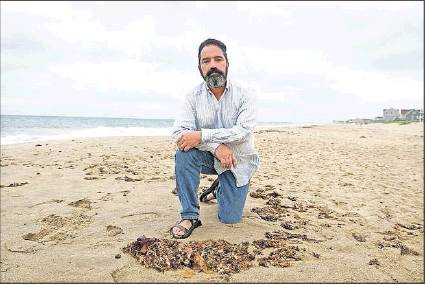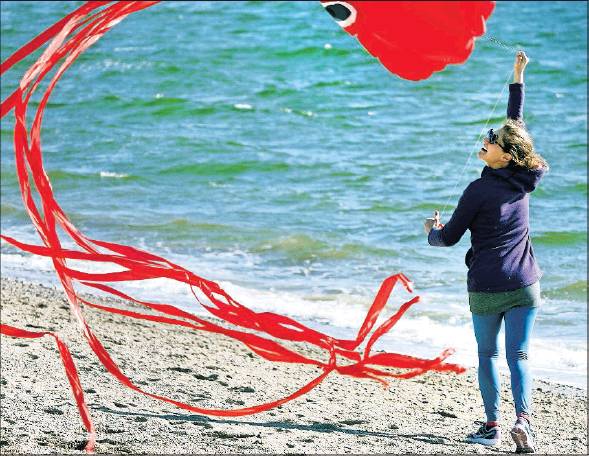Access vs. privacy: Lawmakers seek balance on beach
Bill would draw line in the sand at 10 feet above most recent high tide mark
By Brian Amaral Journal Staff Writer
State lawmakers are proposing a bill they say will finally bring clarity to the age-old puzzle of access to the shore in Rhode Island.
A bill introduced in the House last month would carve out a new exemption in state criminal trespassing law: People wouldn’t be arrested or charged if they were trying to exercise their constitutional privileges within 10 feet of the most recent high tide line on the sandy or rocky shore.
“We’re not shrinking anyone’s property,” said state Rep. Blake Filippi, R-New Shoreham. “We’re just saying the state is not going to come in and criminally enforce things on that property. I think it’s a smart way of preserving our constitutional rights while respecting private property.”
Its proponents say the legislation would once and for all bring some clarity to the long-debated question of where private rights end and public access begins on the Rhode Island coast, avoiding costly lawsuits if governments tried to take properties or declare them public.
The current law marking the public-access boundary on the shore isn’t a visible point on the sand on a particular day. Instead it’s an average measurement of high water heights taken over a nearly two-decade cycle. Under current law, if people are knowingly on the landward side of the so-called mean high tide line, they could be arrested for trespassing.
The state Constitution gives people the right to fish from the shore, gather seaweed, leave the shore to swim or simply pass along the shore.
But without a visible indication of where that line is, those privileges are too hard to use, some lawmakers argue.
So the legislation, introduced last month in the House, would provide what its proponents say is a more practical boundary where people could go without being arrested: 10 feet from the most recent high tide line. The most recent high tide line is generally visible by looking at the wet sand line or the seaweed line, said Filippi, who called it imperfect but an improvement over the mean high tide line.
State Rep. Terri Cortvriend, a Democrat of Portsmouth, introduced the legislation.
“With sea level rise, this is going to be an issue we need to clean up,” Cortvriend said.
Companion legislation has been introduced in the Senate.
Under the proposal, private landowners could still own to the mean high tide line, and they could still sue people for trespassing in the area above that line in civil court. But trespassing there would no longer be a crime.
“They still own it,” Cortvriend said. “They just can’t block access.”
By leaving the actual property lines alone, and declining to provide some sort of easement, the lawmakers are hoping to avoid costly lawsuits over claims that the government is taking people’s properties.
But if the bill became a law, those lawsuits would be as inevitable as the tide.
“This bill, if enacted, is most likely dead on arrival as an unconstitutional taking of private property,” said William Landry, an attorney who has represented a number of private property owners along the shore. “It would effectively wrest 10 feet of dry sand beach area above the mean high water line from private ownership and place it in the public domain without compensation.”
The assessed value of that property around Rhode Island “would easily be in the hundreds of millions of dollars,” Landry said in an email.
Since the days of Roger Williams, Rhode Island law has recognized a robust right to access the shore. But in three and a half centuries, the state still hasn’t come to an agreement on what that access means and where, precisely, the line ought to be drawn.
People who argue for more shoreline access say the mean high tide line is too difficult to spot for the average beach walker or seaweed collector. Plus, they say, it changes every day as a new tide rolls in.
Private homeowners, on the other hand, say the line can be definitively measured — and in some cases have argued that their property, as their surveyors have told them, is now in the water at all times, giving them the right to boot people from the beach.
Such was the case when Scott Keeley, a Charlestown resident, was arrested in June of last year while collecting seaweed. He was just to the east of the Charlestown Town Beach, in front of private homes in South Kingstown. Property owners there hired a security guard to patrol the area, who summoned the local police, who arrested Keeley.
The issue is always roiling under the surface, except when it crests into public view. In places like South Kingstown and Charlestown, tensions are ebbing. One Charlestown resident recently likened a beachfront home’s no-trespassing sign to one you might see in North Korea. A South Kingstown resident said that Keeley’s arrest was a “staged event,” intended to provoke exactly what it provoked, and after seeing media coverage of it, she understood for the first time “what fake news is.”
Rhode Island has a tradition dating to its founding of respecting the privileges of the shore, said Dennis Nixon, a lawyer and University of Rhode Island professor of marine affairs and the director of the Rhode Island Sea Grant.
From the King Charles II Charter to the state’s early constitution to the 1986 convention, those rights were recognized and developed. As a staffer advising a delegate to the 1986 convention, Nixon worked to propose laying out explicitly what privileges people have on the Rhode Island shore, and voters approved it by a more than two-to-one margin.
But beaches are dynamic places, and much has changed since 1986 — legally, geologically, socially. With sea level rise, the problem is not going away.
“Properties are just being lost to the ocean, and the boundary is moving landward, and there is nothing a property owner can do about it,” Nixon said. bamaral@ providencejournal.com
(401) 277-7615
On Twitter: @bamaral44

